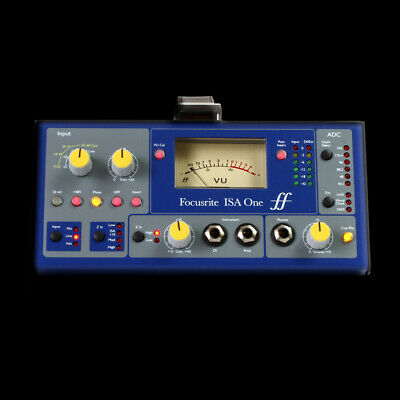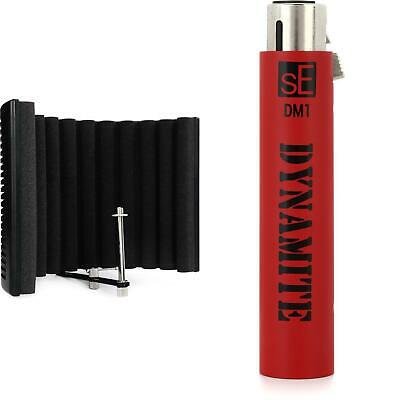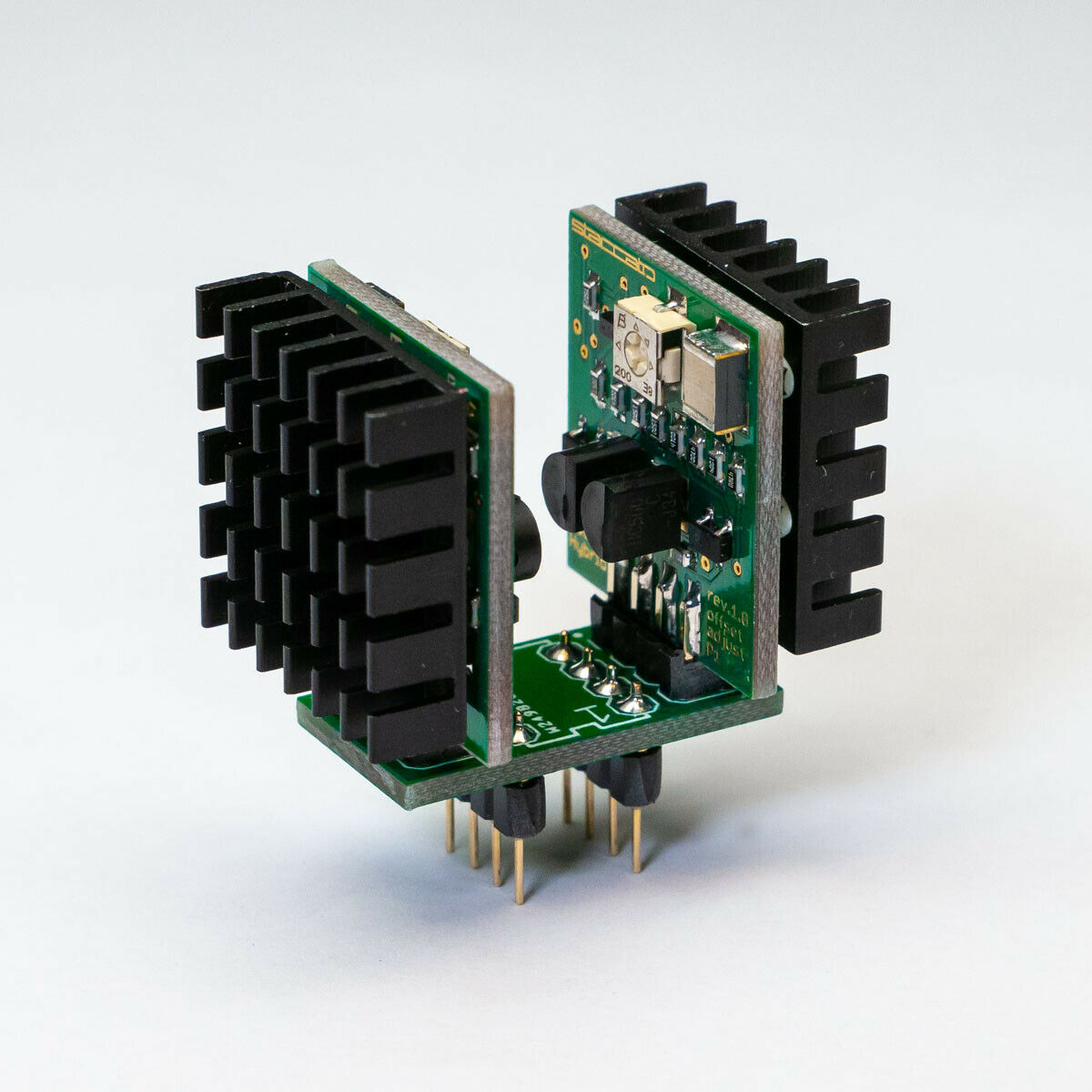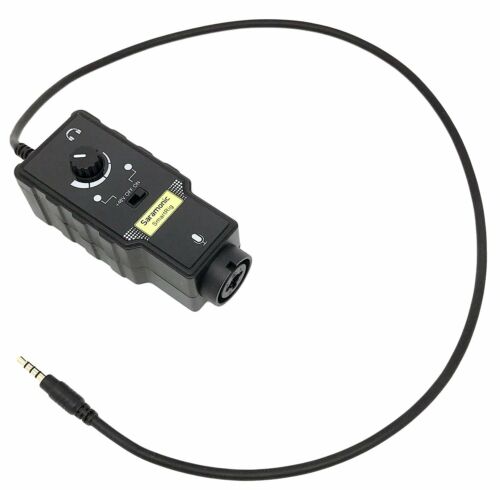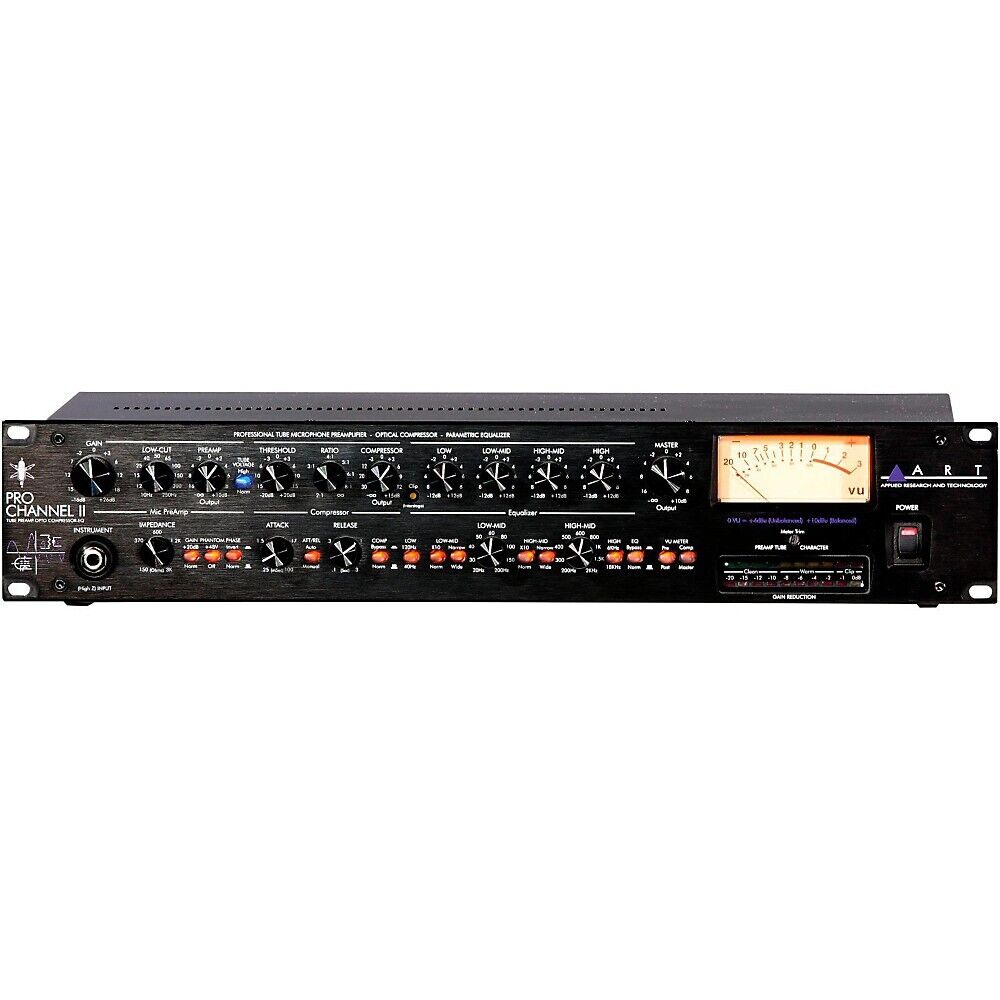-40%
Focusrite ISA1 One Analog Microphone Preamp
$ 278.78
- Description
- Size Guide
Description
Shop By DepartmentNew Arrivals
On Sale
Pre-Owned Gear & B-Stock
Focusrite ISA1 One Analog Microphone Preamp
Mint Condition - 6 Month Alto Music Warranty
The ISA One microphone preamplifier delivers Focusrite's prestigious ISA transformer-based preamp in a rugged and portable chassis, at a groundbreaking price.
ISA One features the classic vintage microphone preamplifier topology from the original ISA110 module, which formed the cornerstone of each channel of Focusrite's legendary Forté console.
The preamp is complemented by a line input and an independent D.I. channel, complete with dedicated gain control, active or passive impedance switch, a TRS Jack output for routing to an amp and an independent XLR output on the rear. This flexible independent D.I. makes the ISA One ideal both for engineers wishing to blend a D.I.’d guitar signal with a mic’d guitar cabinet, and for demanding performers who require a single classic solution for both guitar and vocals.
A variable impedance circuit has been added, allowing the user to switch between four carefully selected input impedance settings. In addition to the original ISA110 impedance, three further impedance settings allow perfect matching, or creative mismatching of the preamp with any microphone. ISA One also features an insert point, should the need arise to place extra processing between the preamp or D.I. and the optional converter. Phantom power, phase reverse and a 75Hz, 18dB/octave high-pass filter are also available from the angled front fascia.
Independent input metering for both channels is provided in the form of a moving coil VU meter with variable calibration to suit analogue and digital recording media, alongside two six-LED peak meters; inputs can be metered either pre- or post-insert. The meter calibrations utilise all the same reference points as Avid's Pro Tools HD system, allowing effortless line-up.
ISA One’s headphone output features a dedicated volume control, which delivers an external stereo cue mix (a simple click track or a stereo mix feed from an interface or a live console) fed to the headphones via two TRS jack inputs on the rear of the unit.
An optional state-of-the-art stereo A-D converter is also available (the same card as used with the ISA430 MkII).
NOTE: The ISA One Digital comes with the A-D converter as standard.
Key Features
ISA series transformer-based preamplifier
Encased in a rugged and portable chassis, ISA One offers the classic Focusrite microphone preamplifier at its lowest cost to date.
Flexible independent D.I. channel
ISA One is ideal for both engineers and demanding performers alike, featuring independent gain control, an output for routing to an amp, an independent XLR output on the rear and routing to the optional A-D converter.
Switchable impedance
Choose one of four carefully selected input impedances, including the original ISA110 setting, to suit any microphone.
Headphone output with volume control
ISA One can feed either a sum of the two inputs to the headphones output, or an external stereo cue mix (such as a stereo mix feed from an interface) via two TRS Jack inputs on the rear of the unit.
Dedicated insert point
Allows you to place extra processing between the preamplifier or D.I. and the optional converter, such as an EQ or compressor.
Optional stereo 192kHz A-D converter
You can choose to upgrade your unit with an optional digital card that delivers the best A-D performance in its class (dynamic range of 118dB). Alternatively, the ISA One Digital<=Link to ISA One Digital product page> comes with the A-D converter as standard.
Specifications
We always quote 'real world' performance figures (measured to the AES17 standard). Some companies choose to quote chipset performance, which is misleading, and here's why.
Mic Input Response
• Gain range = 0dB to 60dB in 10dB steps + 20 dB of variable gain
• Input Impedance, variable as follows:
(Switched Impedance setting Equivalent Input Impedance at 1kHz)
Low = 600 Ohms
ISA110 = 1400 Ohms
Med = 2400 Ohms
High = 6800 Ohms
• EIN (equivalent input noise) = -126dB measured at 60dB of gain with 150 Ohm terminating impedance and 22Hz/22kHz band-pass filter
• Noise at main output with gain at unity (0dB) = -97dBu measured with a 22Hz/22kHz band-pass filter
• Signal to noise ratio relative to max headroom (9dBu) = 106dB
• THD at medium gain (30dB) = 0.0009% measured with a 1kHz -20dBu input signal and with a 22Hz/22kHz band-pass filter
• Frequency response at minimum gain (0dB) = -0.5dB down at 10Hz and -3dB down at 125kHz
• Frequency response at maximum gain (60dB) = -3dB down at 16Hz and -3dB down 118kHz
• CMRR=98dB (Channel 1, 1kHz, maximum gain with +24 dBu input)
• Crosstalk Channel to Channel: with 10dB@1kHz input to chA, chB output =104dBrA. With 10dB@10kHz input to chA, chB output = 84dBrA
Line Input Response
• Gain range = -20dB to +10dB in 10dB steps + 20 dB of variable gain
• Input Impedance = 10k? from 10Hz to 200kHz
• Noise at main output with gain at unity (0dB) = -96dBu measured with a 22Hz/22kHz band-pass filter
• Signal to noise ratio relative to max headroom (24dBu)=120dB
• Signal to noise ratio relative to 0dBFS (+22dBu) = 118dB\
• THD at unity gain (0dB) = 0.001% measured with a 0dBu input signal and with a 22Hz/22kHz band-pass filter
• Frequency Response at unity gain (0dB) = -0.3dB down at 10Hz and -3dB down at 200kHz
Instrument Input Response
• Gain range = 10dB to 40dB continuously variable
• Input Impedance:
High = greater than1M?
Low =greater than 300k?
• Noise at minimum gain (+10dB) = -92dBu measured with a 22Hz/22kHz band-pass filter
• Noise at maximum gain (+40dB) = -62dBu measured with a 22Hz/22kHz band-pass filter
• THD at minimum gain (+10dB) = 0.001% measured with a 10dBu input signal and with a 22Hz/22kHz band-pass filter
• Frequency Response at 10dB gain with -10dB input = 10Hz-100kHz +/- 0.6dB
• Frequency Response at 40dB gain with -40dB input = -2.5dB down at 10Hz and 0dB at 100kHz
High Pass Filter
• Roll off = 18dB per octave 3 pole filter
• Fixed Frequency 75Hz measured at the 3dB down point
Meters
• Moving coil (MC) meter is factory calibrated to 0VU = +4dBu with 1kHz sinewave. With the VU Cal button pressed the meter can be adjusted on the rear panel to allow 0VU to equal +10dBu to +26dBu with the centre detent being equal to +22dBu.
• Peak LED meters calibrated in the detent position for 0dBFS = +22dBu, calibration is adjustable on the rear panel to allow 0dBFS to equal +10dBu to +26dBu
• Routing for MC and Peak1 meter is after the HPF, pre insert send or switched post insert return. Peak2 is always pre ADC channel 2, which can be fed by external input or Instrument input.
• LED levels are as follows when peak calibration is set to center detent on the rear panel. (This is when using the internal ADC).
0 = +22dBu
-2 = +20dBu
-6 = +16dBu
-12 = +10dBu
-18 = +4dBu
-42 = -20dBu
FRONT AND REAR CONNECTIVITY
Analogue Channel Inputs:
• Mic input: XLR x 1
• Line input: XLR x 1 and TRS x1
• Instrument input TRS Jack: XLR x 1
• External ADC input: TRS Jack x 1
• Return: TRS Jack x 1
Analogue Channel Outputs:
• Send: TRS Jack x 1
• Balanced line output: XLR x 1
• DI output: XLR x 1
• DI through: TS Jack x 1
Analogue Channel Additional I/O:
• Cue mix left input: TRS Jack x 1
• Cue mix right input: TRS Jack x 1
• Headphones output: ¼” TRS Jack x 1
Weight
• 3.9kg
• 8.6Ibs
Dimensions
• 220mm (W) x 104mm (H) x 254 - 290mm (D - top to bottom)
• 8.66" (W) x 4.1" (H) x 10" - 11.4" (D - top to bottom)
Shipping Policy
BUYER PAYS SHIPPING-WE SHIP VIA FEDEX OR UPS. WE ACCEPT PAYPAL.
*For an additional charge, overnight or upgraded shipping may be available to buyers in the USA. Email us for more info.
Alto Music will only ship to the address provided by PayPal, and must be a PayPal confirmed address. Any item(s) purchased at a total exceeding 9.99 (prior to shipping charges and or sales tax when applicable) will require a recipient signature upon delivery.
Warranty
New condition items carry manufacturer warranty. Contact us through eBay for more details.
Return Policy
Refunds are issued within 30 days of the date the customer's order is received. Merchandise and packaging MUST be in the same condition as when received. Items may be subject to a restocking fee up to 20%. Alto Music reserves the right to refuse any return if it appears the item has been used. The customer is responsible for return shipping costs. If the customer's order included free shipping, the customer will be refunded order amount, less Alto Music's original shipping cost.
There are absolutely no refunds for the following items:
Software (if unsealed or registered)
Sheet Music
Books
DVDs
Videos
CDs
Harmonicas, Mouthpieces, Earbuds/Earphones/Headphones(if unsealed), or any item that may come in contact with the mouth, ears or nose.
Used merchandise carries a 30-day warranty through Alto Music, unless otherwise specified.
New merchandise carries the original warranty issued by the manufacturer.
There are no warranties for the following items:
Strings
Drumheads
Drum Sticks
REDD.47 mic preamp re-creates the original tube line amps used in Abbey Road Studios' rare, custom EMI REDD.51 recording consoles. This is the unmistakably punchy, aggressive sound that characterized recordings made in Studio Two between 1964 and 1968 - including legendary tracks by The Beatles. Modern features have been added to meet contemporary recording studio standards, such as increased gain that gives you a range of new tonal options, from pristine cleans to rich, classic saturation
MODIFIED THE MIC INSERT TO THE FRONT PANEL INSTEAD OF THE BACK - YOU CAN REWIRE IT TO THE BACK AGAIN IF YOU LIKE
